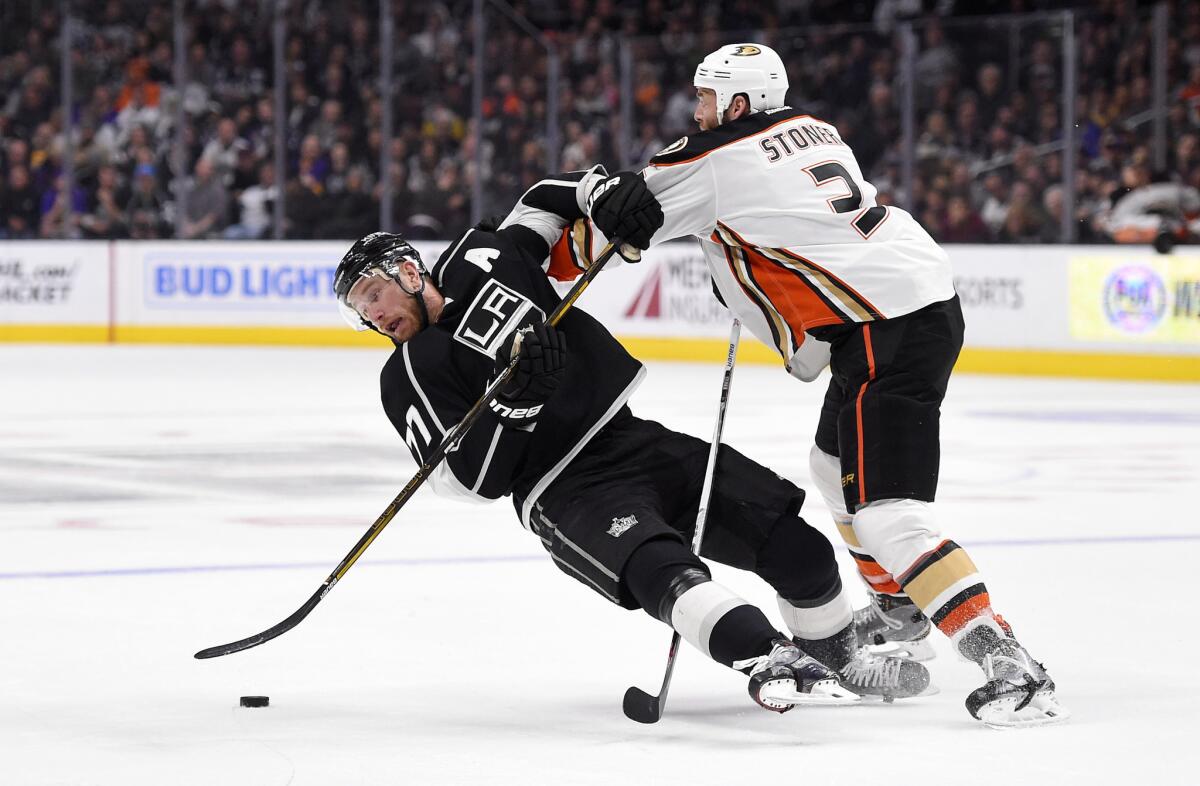Ducks took a cue from the Kings and put defense first

Ducks defenseman Clayton Stoner, right, pushes over Kings center Jeff Carter during the second period on Apr. 7.
- Share via
Just when it seemed there was no way out, after the Ducks had flailed through a 1-7-2 start and couldn’t find line combinations that clicked, necessity became the mother of their reinvention.
On Dec. 18 they were lumped at the bottom of the NHL standings with Toronto and Columbus, at 11-14-5. Faced with falling prohibitively far behind the playoff pack before the new year, Bruce Boudreau came up with an unlikely plan for a coach known for teams that attacked fiercely and defended somewhat casually: the Ducks would compete by learning to play solid, rugged defense.
There was, really, no other option. To sell it to his players, all Boudreau had to do was mention the Kings, who had made teamwide defensive responsibility and stellar goaltending the foundation of their Stanley Cup triumphs in 2012 and again in 2014.
Slowly, the notion took hold among the Ducks, starting with a 1-0 victory at Calgary on Dec. 29. That grew into a league-best 34-10-5 record after Christmas and, on Sunday, was capped by an unusual triple crown.
Given a chance to win the Pacific Division title after the Kings squandered a three-goal lead over Winnipeg on Saturday and lost in overtime, the Ducks seized the moment Sunday. Their 2-0 victory over the Washington Capitals clinched their fourth consecutive division championship, gave goaltenders John Gibson and Frederik Andersen the Jennings trophy for playing on the team that allowed the fewest goals (188), and also left the team No. 1 in the NHL in special-teams play with a power-play efficiency of 23.2 percent and penalty-killing success rate of 87.2%.
“It’s been a roller coaster,” right wing Corey Perry said in a postgame interview on Fox Sports Prime. “After Christmas we were the team we thought we could be.”
The Ducks kinged the Kings, in essence, by retrenching and building a defense-first focus that offered players a way out of a deep deficit and paved the way for offense to follow.
“We preached it a lot this winter and the players bought right into it,” Boudreau said Sunday in an interview recorded by the Capitals. “When we weren’t scoring goals at the beginning of the year we said, ‘Hey, listen, we’d better be good defensively or we’re not going to win any games.’ They jumped right on board because they’d rather win games than score goals.”
Winning the division title will bring the Ducks no immediate reward. Starting Friday at Honda Center they’ll get a difficult first-round matchup against the Nashville Predators, who defy the image of a wild-card team that got lucky and got into the playoffs. The Predators are tremendously deep on defense and formidable in goal and have been given more offensive freedom the last two seasons under Coach Peter Laviolette than before. Travel to and from the Central time zone will test everyone’s stamina.
Which raises the question of whether the Kings really lost all that much by losing the division lead and falling to second, which pits them against the third-place San Jose Sharks.
The Kings, who will open at home on Thursday, will have shorter travel than if they’d drawn Nashville. They’ll also have a psychological advantage of the memory of their 2014 first-round comeback against the Sharks, when the Kings became the fourth team in NHL history to overcome an opponent’s 3-0 series lead.
Both teams have changed since then. The Sharks are coached by Peter deBoer — who guided New Jersey to a Stanley Cup Final loss to the Kings in 2012 — and this season had a slow start but a fine finish, though their home record of 18-20-3 was the worst among all 16 playoff teams. It was interesting to see them thrive while under less pressure than they’ve had in previous seasons. They’re supposed to be rebuilding, but Joe Thornton, Patrick Marleau, Brent Burns, Joe Pavelski and Logan Couture remain a potent core.
The Kings have become less daunting defensively than they were in 2014 because of the departures of Willie Mitchell and Slava Voynov and the injury-induced absence of rugged Matt Greene. The institutional memory of winning that exists among their core players is immeasurably valuable, but they haven’t been able to impose their will as consistently as in seasons past.
If the Kings and Ducks win their respective first-round series they’ll meet in the West semifinals, almost too great a gift to ask for. But it’s possible because the Kings set a path and the Ducks followed them in learning the virtues of defense.
More to Read
Go beyond the scoreboard
Get the latest on L.A.'s teams in the daily Sports Report newsletter.
You may occasionally receive promotional content from the Los Angeles Times.






